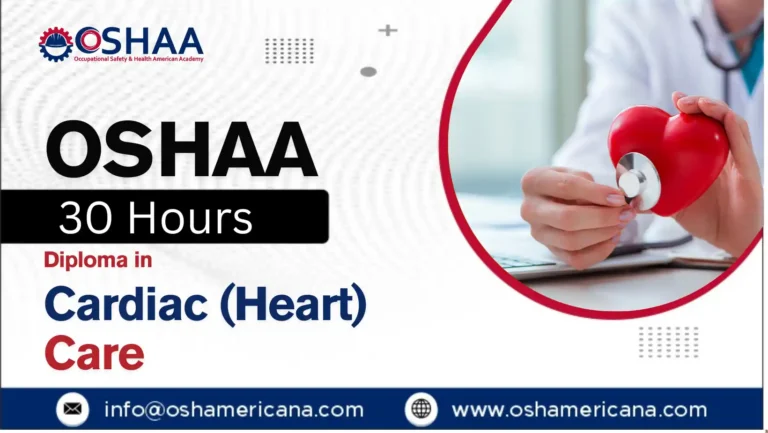Delivering high-quality care is the cornerstone of any effective healthcare system. The OSHAA 30-Hours Professional Diploma in Quality and Service Delivery in Healthcare offers comprehensive training for professionals aiming to enhance performance, improve patient outcomes, and implement continuous quality improvement within healthcare settings. This diploma provides participants with the knowledge and tools required to evaluate healthcare systems critically and lead service improvement initiatives with confidence and competence.
Quality and service delivery in healthcare encompass a wide spectrum of responsibilities, including patient safety, operational efficiency, staff performance, and clinical governance. With growing expectations for better care outcomes and resource efficiency, healthcare organisations must focus on robust quality systems and consistent service delivery standards.
Spanning 30 hours of structured learning, this programme explores the principles and practices behind delivering high-quality healthcare services. Participants will examine the dimensions of healthcare quality, including patient-centred care, access to services, safety standards, and performance measurement.
The OSHAA 30-Hours Professional Diploma in Quality and Service Delivery in Healthcare delivers industry-relevant training developed by experts in healthcare quality and safety. The course combines academic rigour with practical insight, ensuring participants are prepared to lead change, improve outcomes, and promote excellence within healthcare systems.
This diploma serves as a solid foundation for those seeking to elevate their expertise and influence the future of quality and service excellence in healthcare.
OSHAA 30-Hours Professional Diploma in Quality and Service Delivery in Healthcare
Study Units
Learning Outcomes
Introduction to Quality in Healthcare and Service Delivery Concepts (3 hours)
- Understand the fundamental concepts of quality in healthcare services
- Recognise the importance of service delivery in achieving healthcare objectives
- Identify the key components of effective healthcare quality frameworks
- Explore the relationship between quality, safety, and patient outcomes
Dimensions of Healthcare Quality and Patient-Centred Care (4 hours)
- Define the core dimensions of healthcare quality including effectiveness, safety, and timeliness
- Understand the principles and practices of patient-centred care
- Apply strategies to improve communication, respect, and dignity in healthcare delivery
- Evaluate how patient feedback contributes to quality improvement
Quality Improvement Tools and Techniques (4 hours)
- Identify commonly used quality improvement tools such as PDSA cycles and fishbone diagrams
- Apply process mapping and root cause analysis to healthcare settings
- Develop small-scale quality improvement initiatives
- Understand how to measure the impact of quality improvement efforts
Clinical Governance and Accountability Frameworks (5 hours)
- Understand the key elements of clinical governance including audit, risk management, and professional development
- Recognise the roles and responsibilities within healthcare accountability structures
- Explore how clinical governance supports continuous quality improvement
- Apply principles of transparency and ethical practice in clinical environments
Measuring and Monitoring Healthcare Performance Indicators (4 hours)
- Identify key performance indicators (KPIs) relevant to healthcare quality
- Understand methods for collecting and analysing healthcare data
- Interpret data to identify trends and areas for improvement
- Use performance information to support evidence-based decision-making
Risk Management and Patient Safety Practices (3 hours)
- Understand the principles of risk assessment and mitigation in healthcare
- Identify common patient safety risks and incidents
- Apply tools such as risk registers and safety checklists to improve outcomes
- Promote a culture of safety through reporting and learning from errors
Healthcare Service Delivery Models and Systems (3 hours)
- Explore various models of healthcare delivery including integrated care and primary care systems
- Compare public, private, and mixed service delivery structures
- Understand how system design impacts access, quality, and efficiency
- Evaluate the role of interdisciplinary teams in service delivery
Enhancing Patient Experience and Service Access (4 hours)
- Understand the factors influencing patient satisfaction and experience
- Develop strategies to improve communication, continuity, and responsiveness of care
- Identify barriers to healthcare access and propose solutions to address inequities
- Promote inclusive and culturally competent care delivery approaches
Course Benefits: OSHAA 30-Hours Professional Diploma in Quality and Service Delivery in Healthcare
- Builds a strong foundation in healthcare quality assurance and effective service delivery practices
- Equips participants with practical skills to implement quality improvement initiatives within healthcare settings
- Enhances understanding of clinical governance, accountability, and regulatory compliance
- Strengthens the ability to measure, monitor, and analyse healthcare performance indicators
- Promotes a patient-centred approach to care, improving satisfaction and health outcomes
- Develops critical thinking in identifying risks and improving patient safety protocols
- Supports professional development for leadership roles in quality management and operational performance
- Provides knowledge of diverse healthcare service models, enabling better system-level planning and delivery
- Encourages evidence-based decision-making and continuous service improvement
- Offers an industry-recognised qualification aligned with UK and international healthcare quality standards
The OSHAA 30-Hours Professional Diploma in Quality and Service Delivery in Healthcare is designed for participants involved in or aspiring to roles focused on healthcare quality, patient safety, and service improvement. It is particularly suitable for:
- Healthcare professionals seeking to enhance their understanding of quality assurance and clinical governance
- Managers and supervisors responsible for service delivery in hospitals, clinics, or community health services
- Policy advisors and healthcare administrators involved in planning, compliance, or regulatory oversight
- Quality improvement officers and risk managers aiming to drive safety and operational excellence
- Health informatics and data professionals supporting performance monitoring and reporting
- Participants preparing for leadership positions within healthcare quality or service coordination
This course is ideal for individuals committed to improving patient outcomes, ensuring service efficiency, and fostering a culture of quality in healthcare environments.







